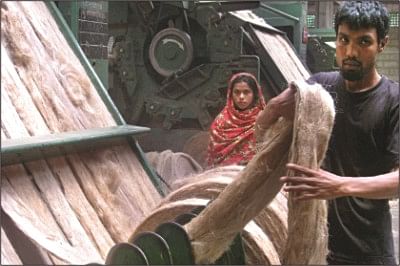Jute bag exports to India hit snag

A worker rolls semi-processed jute at the factory of Gem Jute Ltd in the northern district of Panchagarh.Photo: STAR
Exports of jute bags to India faced a setback last month, as the largest buyer of jute products from Bangladesh started requiring exporters to print the country of origin on each bag, enforcing a rule ignored for the past eight years, industry insiders said.
Traditionally, jute bag exporters print the country of origin and details of the products on the carton or packaging containing the bags. But in recent weeks India has barred jute sacks that do not have "Made in Bangladesh" mark on them.
Bangladesh Jute Mills Corporation (BJMC), the umbrella body of state-owned jute mills, sent a letter to the Textile and Jute Secretary that charged that putting labels on each bag increases the production cost “by at least 3 percent." This means Bangladesh's dream to revive the glory of the golden fibre may not be realised, BJMC officials said.
But not all, even in the jute industry, agree; most peg the label cost at less than a single taka.
"This (production cost) is not a big concern for us," said Ehsan Zaman, head of operations of Gem Jute Ltd, a private jute mill in the northern district of Panchagarh. “Not yet."
But he fears that it will slow the exports out of Bangladesh, as demand for labelled bags may decline in India.
Zaman notes that the labels will prevent Indian firms who imported unlabelled jute bags from gaining a state subsidy on re-exports to other nations. India created the subsidy to buoy its own jute only. "Indian businessmen who import our bags and re-export them to other countries on subsidy are more concerned,” he said.
Of the five lakh bales of jute products exported by Bangladesh in the last fiscal year, India imported 1.75 lakh bales of jute bags, BJMC officials said. Bangladesh earned $540 million from exports of jute products last fiscal year, according to the Export Promotion Bureau.
Textile and Jute Secretary Ashraful Mokbul told The Daily Star that he received the BJMC letter and is checking its claims with ministries of commerce and foreign affairs.
According to the BJMC letter to the jute ministry, dated July 12, a statutory order from India's textile ministry in 2002 required each imported jute bag to have the country of origin printed on it.
"That order, however, has never been enforced, as it increases production cost and India has not been so far strict about it in view of the increasing demand of these bags," said Kamran T Rahman, former chairman of Bangladesh Jute Mills Association (BJMA) who earlier fought against a major non-tariff barrier.
The Indian Jute Mills Association (IJMA) has been lobbying its own government to increase the price of local jute bags. A 61-day strike in Indian jute mills earlier this year failed to win over the government.
India's imports of jute products from Bangladesh and Nepal increased by around 60 percent between April of 2009 and of May 2010, according to IJMA Chairman Manish Poddar. He was quoted in The Hindu Business Line newspaper saying that the price of jute goods imported from these countries is lower than comparable domestic goods.
Bangladeshi industry insiders suspect the enforcement issue was raised to disrupt the competitive imports.
BJMC officials, fearing that Indian customers may be reluctant to use jute bags marked Made in Bangladesh, note that Indian jute bags are largely exempt from country of origin labels requirements.
"We used to export around 100 trucks of jute bags to India daily, but it came down to only seven to five trucks after the markings were made mandatory," said an official of BJMC.

 For all latest news, follow The Daily Star's Google News channel.
For all latest news, follow The Daily Star's Google News channel. 




Comments